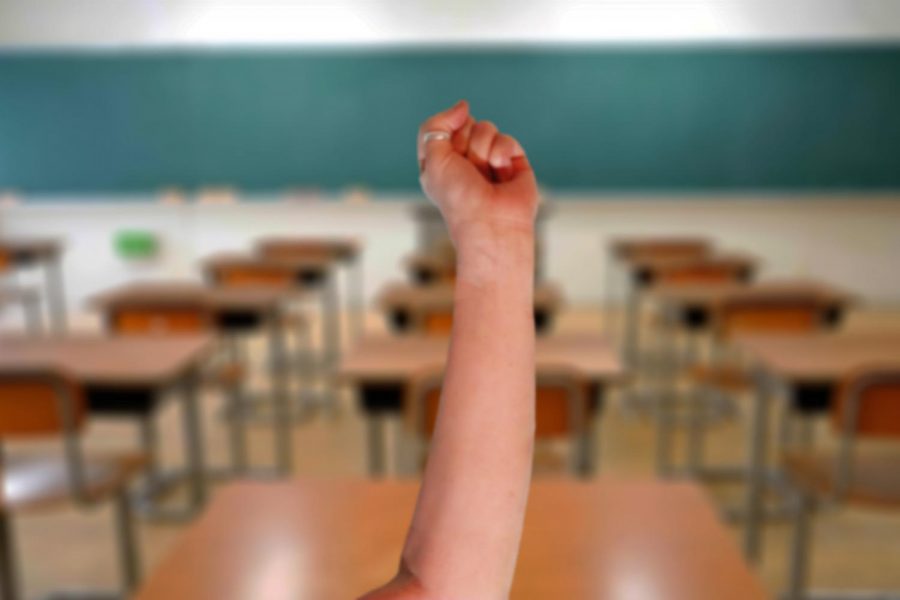The Controversy of a Controversial Classroom
Social justice issues have dominated the outside world, but some wonder if school is an appropriate environment to discuss these complex issues.
Social Justice is an important topic inside and outside the classroom. With the topic of social justice there comes many issues regarding different opinions and difficult to address situations. Having an open mind to others is important when talking about a serious issue such as social justice.
According to the Oxford English Dictionary, the definition of ‘controversial’ is “giving rise or likely to give rise to public disagreement”. With that definition, one could argue that a variety of things can be considered controversial; for example, whether cats or dogs are better, which football team is the best, whether Black people have equal rights and whether or not they face police brutality. Some may say that only certain topics are controversial while others are not, yet AP Literature teacher Jamie D’Andrea believes that people have different perceptions of what topics are controversial.
“I would argue that any topic that is based on someone’s emotions has the potential to be controversial,” D’Andrea said. “Oftentimes when we feel strongly about something it is not necessarily because of the logic behind it, it is just because of our feelings about it.”
Contrasting opinions can lead to an increase in discussions and arguments surrounding controversial issues. Throughout the duration of the nationwide COVID-19 outbreak this past year, a variety of arguably controversial subjects such as police brutality, LGBTQ+ rights and politics have been brought to light and consequently led to an increase in public discussions and debates. Some of those discussions have also been introduced into the school environment.
“Riots, protests, the Black Lives Matter movement, the presidential election – these things are on the forefront right now, and they are very much playing out in a public view,” D’Andrea said. “I think that the conversations in the classroom mirror what’s happening out in the real world.”
Discussing argumentative topics in the classroom may be a controversy in and of itself. Some believe that discussing tough subjects may benefit students by teaching them how to respect different perspectives and opposing opinions.
“I think that there are benefits in [discussing controversial topics],” junior Brock Sooley said. “I think it would make people more comfortable talking about certain topics.”
Another potential benefit of discussing controversial topics in the classroom could be gaining argumentative skills. According to AP Language and Composition teacher Sarah Ogborn, learning how to properly argue using evidence and reasoning, without resorting to insults and yelling, is important for students to learn.
“Students need to be taught how to [argue], how to be polite and respectful and how to artfully disagree with somebody without saying, ‘you suck’,” Ogborn said. “I think that a lot of what we’re seeing on social media is people don’t know how to engage in the conversation respectfully, so it’s automatically turning somebody off.”
There are also possible drawbacks to discussing controversial subjects in school. Some believe that the classroom is not an appropriate setting for students to learn or talk about controversial topics because it could lead to negative emotions or reactions from students.
According to Teaching Tolerance, it is common for parents and administrators to find it inappropriate for teachers to bring controversial topics into the classroom; in addition, many students resist taboo topics because they don’t want to create conflicts with their peers.
Furthermore, a possible challenge of discussing taboo topics is the teacher’s role. When students engage in difficult conversations, a teacher may need to act as a moderator; however, it can be stressful for the teacher to remain neutral and not share their opinions. Ogborn has encountered some negativity in the past after students shared their controversial opinions, and as an educator, she was trapped in a difficult position.
“The year after Trump was elected… these students started chanting ‘build the wall’, and I grew kind of upset,” Ogborn said. “One of those students recorded me, and it spread throughout the community by a parent on Facebook… I was concerned about my safety.”
As a result, Ogborn believes that she learned some valuable lessons about bringing controversial topics into the classroom and how to protect herself as an educator; furthermore, she understands why some may be against discussing certain topics.
“It’s truly, in some respects, about fear – fear of getting yourself into trouble, fear of having yourself videotaped, fear of not being able to rein it back in,” Ogborn said. “It could totally destroy the culture of your classroom.”
Some educators place the environment of their classroom at top priority, and students may also want to separate school from the problems of the outside world. While some students have become more political on social media as a result of increased conversations surrounding social justice issues, others may not be as politically involved and, as a result, may not want to discuss anything controversial.
“For some people, school is their safe zone,” Sooley said. “When they’re in school, they don’t have to hear about [world issues]. They may just want to focus on school and have fun and talking about subjects like those makes things a little messy.”
However, others believe that while it may be challenging for some students to talk about uncomfortable issues, it is crucial for their development. According to D’Andrea, gaining the ability to think for one’s self and being able to understand personal values and morals is why controversial conversations need to be held in the classroom.
“There are people who shy away from controversial topics because they don’t want to rock the boat,” D’Andrea said. “If we don’t press people to think, if we don’t press people to be able to not just say that they’re right, but prove it, then we find ourselves in a situation where people aren’t thinking for themselves.”
Throughout life, people may encounter controversies within their communities, their personal lives or in society in general. Developing opinions on certain topics could be considered a part of growing and changing as a human being and in the real world; one could argue that it is crucial to be able to respectfully argue for one side or another. In the classroom, however, it may not be as black or white. In some situations, discussing controversial topics in the classroom may be a nice change of pace. On the other hand, sometimes, students may be seeking a break from conflict and may prefer a more neutral environment.






